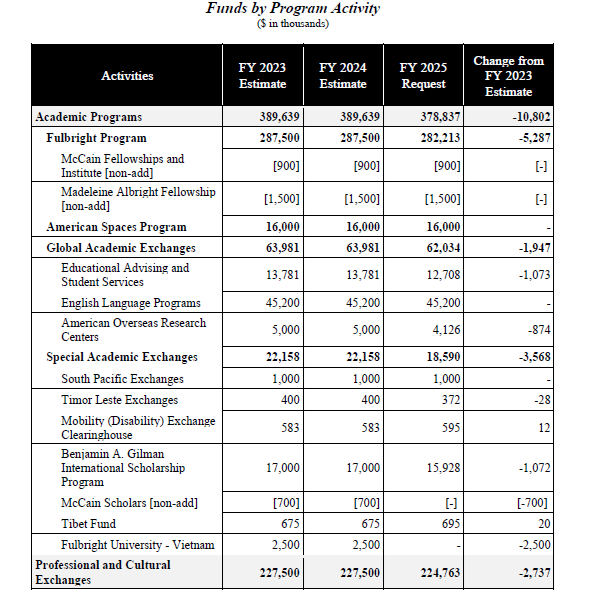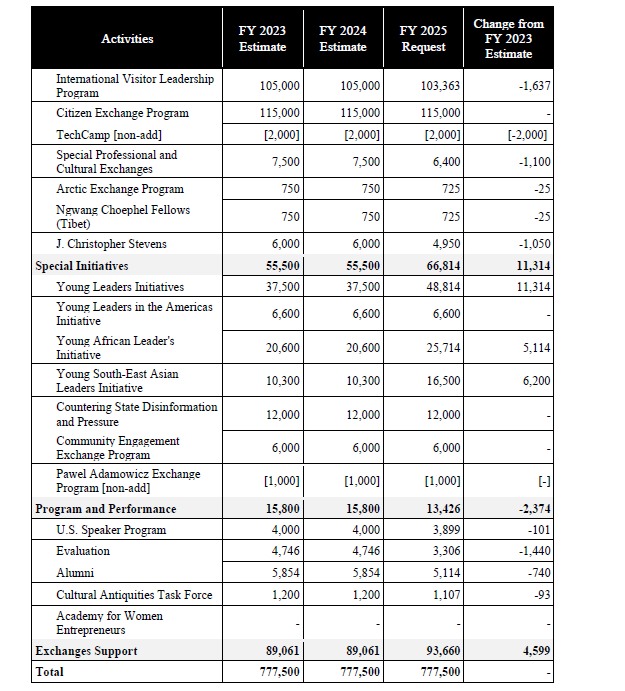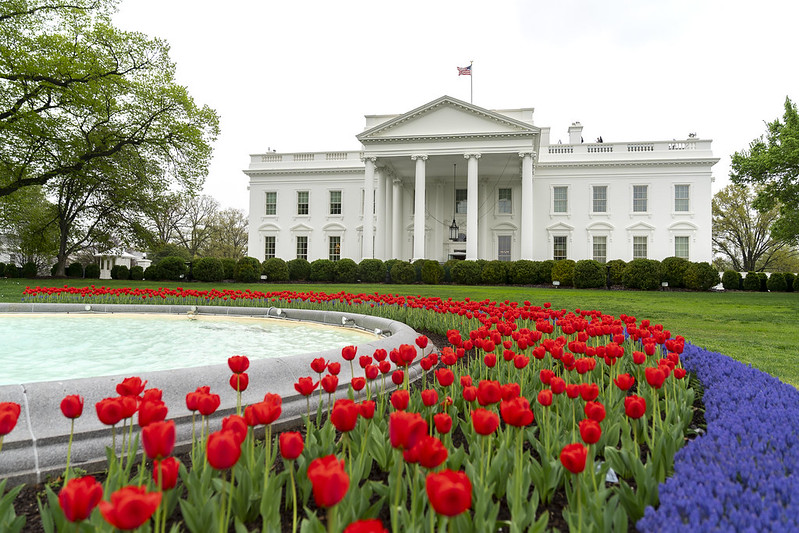By: Andrea Bodine
Fiscal Year (FY) 2024 is not yet finalized, but with the release of the President’s $7.3 trillion Budget Request (PBR) for FY 2025 on Monday, the Biden Administration officially kicked off this year’s appropriations cycle and the next battle over federal funding. For context, this request adheres to the bipartisan spending caps from Congress’ debt ceiling deal last summer. These constraints have a noticeable impact on many areas of the PBR, especially the International Affairs (IA) Budget.
The FY25 request includes a proposed 1% increase ($656 million) for the IA Budget from the FY23 adjusted enacted level, raising it to $64.4 billion. Within that funding, Educational and Cultural Exchange Program (ECE) funding has been allocated $777.5 million (DOS Budget Appendix, pg. 751-752), which is the same amount as the current FY23 enacted level. For a reminder of where funding currently stands, please see the chart below.
| Current Enacted Level (FY23) | $777.5M |
| House FY24 SFOPS Bill | $700.95M |
| Senate FY24 SFOPS Bill | $779.5M |
| FY24 Enacted Level | ? |
| President’s FY25 Budget Request | $777.5M |
ECE fared better than many with a level funding request, particularly when considering the uncertainty around FY24 numbers and the overall political pressure for spending cuts. Although, in reviewing the details in the Department of State’s Congressional Budget Justification (CBJ, pg. 60-64), there are a number of proposed changes for the funding allocation within the account, and as a result, a noticeable impact on the priorities of the Bureau of Educational and Cultural Affairs (ECA). Our main takeaways are below:
- While the topline number is the same as FY23, the proposed ECE budget includes significant “realignments between bureau program activities.” (CBJ, pg. 61)
As with last year’s PBR, there are notable cuts to most of ECA’s flagship programming, including Fulbright (-$5.3 million), Gilman (-$1.1 million), and the International Visitor Leadership Program -($1.6 million), among others. Those funds are reshuffled to account for the increases to the Young Leaders Initiatives programs (+$11.3 million), specifically YALI and YSEALI, as well as Exchanges Support (+$4.6 million). This realignment mirrors the Administration’s FY24 request, but with the lower topline number, the impact is more significant. See below for a comparison between this year’s request, the President’s FY24 request, and the current enacted level.
| FY25 Request: $777.5 M | FY24 Request: $783.7M | FY23 Enacted: $777.5M | |
| Academic Programs | $378.8M* | $381.8M* | $373.6M |
| Professional and Cultural Exchanges | $224.8M | $222.5M | $227.5M |
| Special Initiatives | $66.8M | $66.8M | $55.5M |
| Program and Performance | $13.4M | $13.5M | $15.8M |
| Exchanges Support | $93.7M | $99.1M | $89.1M |
| * Includes American Spaces program (+$16M for FY25 and +$14.9M for FY24), which is not under Academic Programs in the enacted FY23 bill. | |||
- This request reaffirms the Biden Administration’s priorities of engagement with critical regions of Southeast Asia and the African continent.
The proposed increases to the Young Leaders Initiatives programs demonstrate the Biden Administration’s continued commitment to advancing people-to-people exchanges in Southeast Asia and Africa (CBJ, pg. 62), which was a major component of last year’s request as well. We agree that expansion of exchange programs in these critical regions will further bolster the United States’ foreign policy goals. However, when coupled with cuts to other key programming that could also reach those areas and reinforce the YLI efforts, the results won’t be as comprehensive as they have the potential to be.
- Continued budget and political environment constraints will make FY25 an uphill battle for exchanges funding.
This request has little chance of becoming law with the current divided Congress and will likely to be the high funding watermark for the FY25 cycle. Our understanding is that the House and Senate funding numbers, and later the enacted FY25 appropriation, will more than likely be below this level. Given this probability, the PBR is an important reminder that the Alliance and the larger international exchange community needs to engage in robust collective advocacy on Capitol Hill on behalf of our request of $808.6 million and to protect exchanges from potential cuts.
Our advocacy efforts to support strong exchanges funding in FY25 have already started. Notably, our funding request was discussed in more than 125 meetings with congressional offices during our annual Advocacy Day last week. With your help, we will continue to push this request forward throughout this spring and summer to share the importance and power of exchange programs with key policymakers. Stay tuned for ways to get involved!



